June 16, 2025 | 02:02 GMT +7
June 16, 2025 | 02:02 GMT +7
Hotline: 0913.378.918
June 16, 2025 | 02:02 GMT +7
Hotline: 0913.378.918
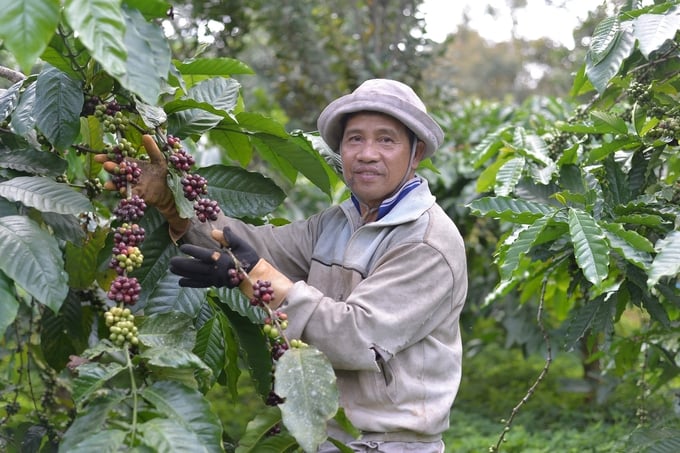
Vietnam sees EUDR as a great opportunity to promote the agricultural sector, in which the coffee industry will develop consciously and sustainably. Photo: Minh Hau.
On May 16, 2023, the European Parliament approved the European Union’s Deforestation-free Regulation (EUDR), which is expected to take effect in December 2024. Among the leading export sectors of Vietnam to the EU market, coffee is an agricultural product that will be significantly affected when this regulation is applied.
According to this Regulation, 100% of Vietnamese coffee products, when imported into the European market, need geolocation information (GPS) to precise locations to identify whether the product caused deforestation.
According to experts, complying with EUDR is positive and necessary for the transition to transparent and sustainable agricultural production, protection of forest resources, and tightening public-private cooperation with the EU market.
Vietnam Agriculture Newspaper has an interview with Ms. Tran Quynh Chi, Regional Director of Asian Landscapes, Initiative for Sustainable Trade (IDH), and Mr. Nguyen Nam Hai, Chairman of the Vietnam Coffee - Cocoa Association (Vicofa), to provide a multi-dimensional view on this issue.
First of all, how do you think EUDR will impact the global coffee industry in general and Vietnam in particular?
Ms. Tran Quynh Chi: Globally, coffee is one of the industries that are most affected by this EU regulation. Coffee producers in the world are primarily small-scale producers in undeveloped or developing countries, so they are not ready to meet the European market’s requirements for the time being.
Meanwhile, Europe is the largest importer of coffee from all countries, which imports about 50% of the world’s total coffee production. When EUDR is applied and takes effect at the end of 2024, about 12.5% of the world’s farmers and smallholders will be affected by this regulation of the European market.
Supporting these farmers to meet new requirements is also a very difficult one, but it is also an opportunity for us. Because this opportunity is available to markets that already meet the requirements for the European market. For example, many have had a low rate of deforestation since 2020. Many countries have very good systems managing forests, databases, and smallholder farmers.
Brazil exemplifies this. This country will have a significant market opportunity when the EU regulation is officially applicable at the end of 2024. Among other countries, ones acting quickly and exceptionally to meet these requirements will be the winners in the world market.
Significantly Vietnam has a very low rate of deforestation due to coffee production. According to an assessment of a very large European buyer, the rate of deforestation for coffee production in Vietnam accounts for less than 0.1%. High chances are Vietnamese products do not violate EUDR. We have to meet the requirements of the European market within the next 18 months, from now until 2024.
The rest is upon local authorities, the Ministry of Agriculture, businesses, and especially farmers to take the initiative in preserving forests. How we’re preserving the forests right now still could pose a risk. Currently, the price of Vietnamese coffee in the world market is increasing. And with the price of coffee increasing like such, it is very likely that farmers will deforest on a small scale to grow coffee.
Therefore, the media message is crucial to help the farmers understand that if they continue to destroy the forest, then their coffee products will not enter the European market and even other markets with similar requirements for deforestation-free.
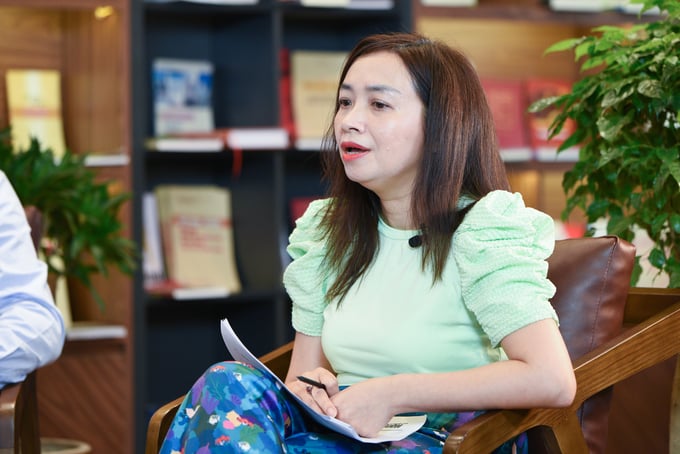
Ms. Tran Quynh Chi, Regional Director of Asia Landscape, Sustainable Trade Initiative (IDH). Photo: Tung Dinh.
Mr. Nguyen Nam Hai: First and foremost, EUDR shows the EU’s responsibility to protect the global environment. Secondly, for Vietnam’s coffee industry in particular, we must also adjust to this regulation and protect the environment.
Over time, the effects of climate change and especially El Nino and have made it difficult for Vietnam’s coffee industry in terms of product quality and output. Currently, Vietnam’s coffee price is the highest in the past 30 years, partly due to El Nino’s impact.
Vietnam’s coffee industry alignment with EU regulations shows our responsibility to protect the environment. As Ms. Tran Quynh Chi mentioned, after the year 2000, we rarely deforest. The total area of our current coffee farming is about 680,000 hectares, most of which are mature and well-preserved. According to EUDR, which prevents deforestation after December 31, 2020 and onwards, I think it is only a very small amount since not many activities happened during Covid-19.
In 680,000 hectares, we export 39% of our production to 27 member countries of the EU market. Therefore, good performance creates an opportunity for us to increase the market share of Vietnamese coffee in the EU, which is a good thing for coffee.
Regarding difficulties, firstly, Vietnamese coffee is mainly produced in farmer households, which are separated and small-scale. Therefore, it is very difficult to trace the product’s origin to the exact location. We need to inform the farmers about EUDR, in case farmers deforest and grow coffee to profit from the high coffee price at this time.
With Vicofa and IDH’s expertise, what suggestions, solutions, and recommendations do you have for regulators and stakeholders to protect the interests of manufacturers and businesses?
Mr. Nguyen Nam Hai: The first suggestion is that ministries, departments, and local authorities should have a database since facilitating the traceability of coffee’s precise location is very difficult.
We can confirm that before December 31, 2020, we rarely deforest to cultivate coffee. However, proving traceability according to the EU’s requirement poses a challenge. Therefore, we look forward to synchronous support from the government, ministries, departments as well as local authorities to solve this.
The second thing is that we must have an accurate forest map on December 31, 2020 so that we can identify low-risk, at-risk, and high-risk zones, enabling us to better implement traceability and screening in the future.
EUDR, once implemented, will also impact farmers’ lives, many of which are ethnic minority farmers who live near the forest. Therefore, the government, as well as ministries and local authorities, should plan to support these people when we proceed with the EU’s regulation.
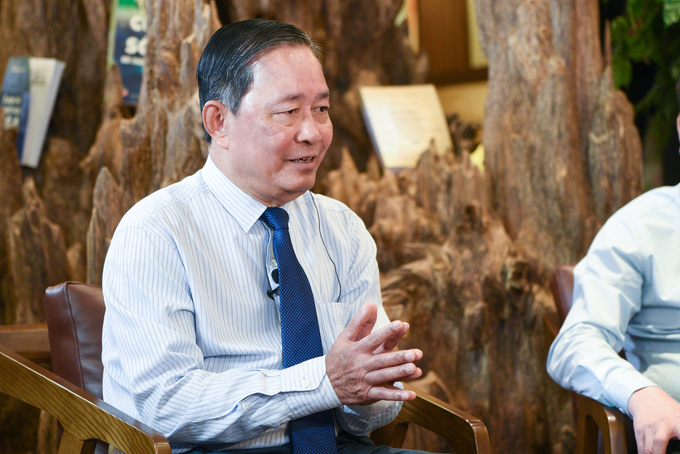
Mr. Nguyen Nam Hai, Chairman of Vietnam Coffee – Cocoa Association. Photo: Tung Dinh.
Ms. Tran Quynh Chi: Just like Mr. Nam Hai just shared, having a national database is the first thing that we have to do in order to export goods. Currently, businesses have started their own databases, such as Nestlé, a large coffee export enterprise.
However, if every business has its own system, then the cost will accelerate. The second thing is that while foreign corporates have the resources to invest in such systems, our local enterprises will face challenges, lacking the financial resources to invest in such a system by themselves and export directly to the European market.
Going back to what Mr. Nam Hai just shared about the traceability system, the EU’s requirement to establish traceability to precise farming locations is a challenge. It is almost impossible for Vietnam’s coffee industry to meet, both in terms of cost and system requirements.
Currently, IDH is coordinating with domestic enterprises to test-run three traceability systems to low-risk, at-risk, and high-risk areas, thereby solving the cost and sharing information with the EU, asking whether it is necessary to apply such a complex system all the way to the precise location.
Fundamentally, we aim for sustainable development both socially and environmentally, without any threats to biodiversity, emissions reduction, or forest preservation. Neither do we exploit child labor, forced labor, and other issues. We aim to build a national database that makes the industry transparent and supports farmers in high-risk areas.
Sustainable production means preparing for the next regulations of the global market. IDH is always ready to accompany MARD, businesses, and local authorities to prepare for the next journey, meeting the EUDR.
Thank you for taking the time to interview with Vietnam Agriculture Newspaper!
Translated by Quynh Chi

(VAN) Noting risks, report examines impacts of avian influenza, changing trade patterns since 2022, fish fraud, and shipping industry’s net-zero goals.

(VAN) Mr. Tran Quang Bao, General Director of the Forestry and Forest Protection Department, met and worked with the International Wood Products Association to promote cooperation in the field of timber trade.

(VAN) China's outbound shipments of rare earths in May jumped 23% on the month to their highest in a year, though Beijing's export curbs on some of the critical minerals halted some overseas sales.

(VAN) To sustain capital flow, administrative reform alone is not enough; what farmers truly need is an ecosystem where both government and businesses grow together in support.
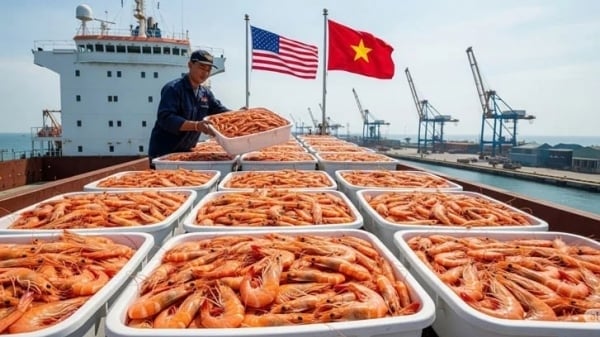
(VAN) Vietnam and the United States are proactively working together, each in their own way, to ensure that every container of agricultural goods carries not just products, but also long-term trust and value.
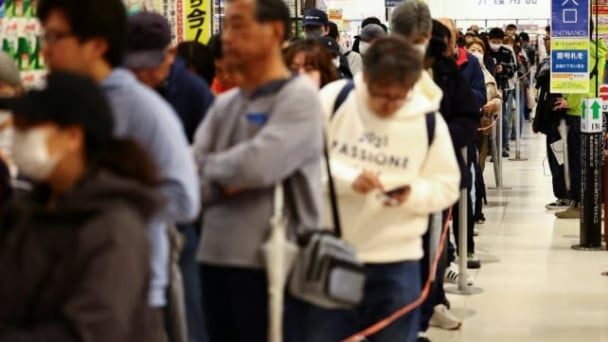
(VAN) Stores have started selling rice from the government’s stockpile to feed demand for the staple.
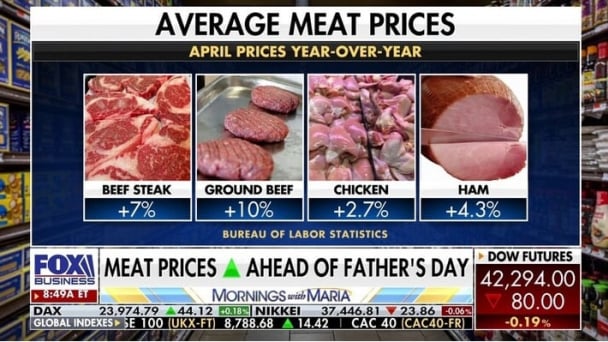
(VAN) Omaha Steaks CEO says rebuilding cattle herds will take about a year to ease price pressures.